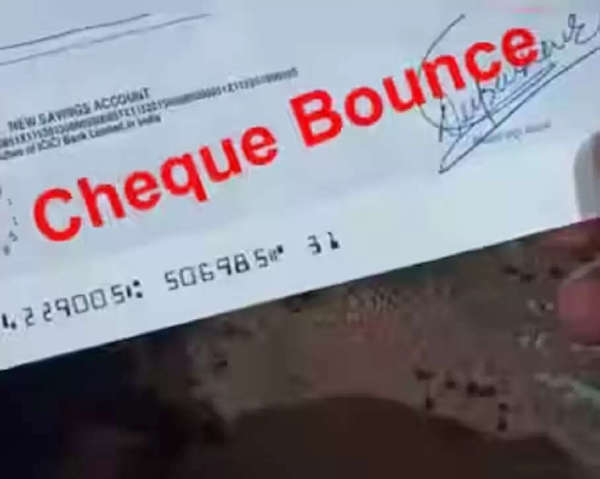
Do not take Cheque Bounce lightly! Know what is Section 138, when can there be 2 years of jail and double the fine. In this article, understand the entire legal process of Cheque Bounce, the reasons and prevention methods in easy language.
In today's digital age, even though the use of UPI and net banking has increased, but even today cheque is considered a reliable means in business, loan EMI and many big transactions. But many times cases of Cheque Bounce also come to the fore. In the technical language of the bank, it is called 'Dishonored Cheque'. Most people consider it a minor incident, but it is a crime under Indian law.
Under Section 138 of the Negotiable Instrument Act, 1881, bouncing of a cheque is a punishable offence, for which there is provision for both heavy fine and jail. Let us understand when a cheque bounces, what is its legal process and how you can avoid this trouble.
What are the reasons for your cheque to bounce?
Insufficient funds: The most common reason is that there is less money in the account than the amount written on the cheque.
Signature mismatch: The signature on the cheque does not match the bank records.
Overwriting/Errors: There are deletions or errors in words or numbers on the cheque.
Cheque outdated: The cheque has not been deposited in the bank within 3 months from the date of issue.
Account closed: The account from which the cheque has been issued has been closed.
Stop Payment: The person who issued the cheque has himself instructed the bank to stop the payment.
No company seal: If the cheque is from a company's account and is not stamped.
Does a lawsuit start as soon as a cheque bounces?
No, the law gives you a full chance to correct your mistake. You are not sued as soon as the cheque bounces. There is a set legal process for this. As soon as the cheque bounces, the bank gives a 'Cheque Return Memo' to the creditor (who was supposed to receive the money), which states the reason for the bounce. After this, the creditor has to send a legal notice to the debtor (who gave the cheque) within 30 days. This notice says that the cheque amount should be paid within 15 days. After receiving the notice, the debtor has 15 days to make the payment. If he pays the money during this time, the matter ends here.
When does a lawsuit arise?
If the debtor does not make the payment or respond to the notice within 15 days after receiving the notice, then the creditor can file a criminal complaint under Section 138 of the NI Act in the Magistrate's court within the next 30 days.
What can be the punishment and fine?
If the case of Cheque Bounce is proved in the court, then the debtor can be severely punished if found guilty -
In such a case, there can be a jail term of up to 2 years.
A fine of up to double the amount written on the cheque can be imposed.
The court can sentence both jail and fine depending on the severity of the case.
The bank also charges a charge when the cheque bounces
Apart from the legal penalty, banks also levy a penalty when the cheque bounces. This penalty can be imposed on both the person who issued the cheque (debtor) and the person in whose account the cheque was deposited (creditor). All banks have different charges.
FAQs
1. How long is a cheque valid?
A cheque is valid for 3 months from the date of issue. After that it is called a 'Stale Cheque' and the bank does not accept it.
2. If the cheque bounces due to mismatch of signature, can a case still be filed?
Yes, whatever the reason, if the creditor does not get the money and you do not make the payment even after notice, he can file a case under Section 138.
3. Can a settlement be made outside the court?
Yes, the case of cheque bounce is a "Compoundable Offence", that is, both the parties can settle the matter outside the court or in the court at any time with mutual consent.
4. What happens if a cheque given as a gift or donation bounces?
If the cheque is not given in lieu of any legal liability or debt, but as a gift or donation, then a case under Section 138 does not stand if it bounces. You will have to prove that there was no debt against the cheque.
5. My cheque has bounced, what should I do first?
First, contact the creditor and clarify the situation. If you receive a legal notice, take it seriously and try to make the payment within 15 days or consult a lawyer.
-
Not only Madhuri Dixit, Vinod Khanna lost control while filming intimate scene with this actress too…, her name is…

-
India’s most popular film of 2025 made 500% profit; beats Sitaare Zameen Par, Sikandar, Kesari Chapter 2, name is…, actress is…

-
What is the connection of Apple COO Sabih Khan with Rampur and Moradabad in UP?

-
Sardaar Ji 3 Box Office Collection: Diljit Dosanjh-Hania Aamir Starrer Becomes The Highest-Grossing Punjabi Film Of 2025, Despite Not Releasing In India

-
Toddler Dies After Mother Leaves Him Inside Car To Get Lip Filler At Spa In US's California